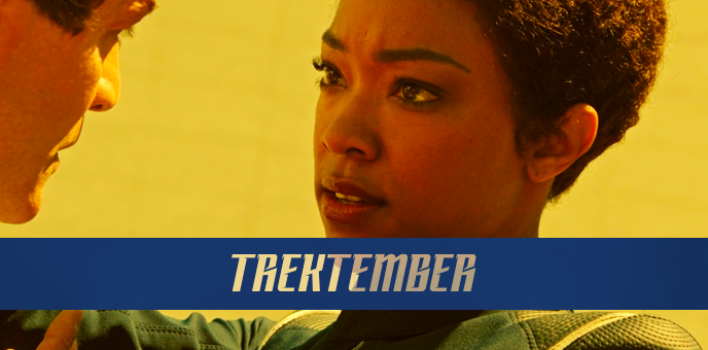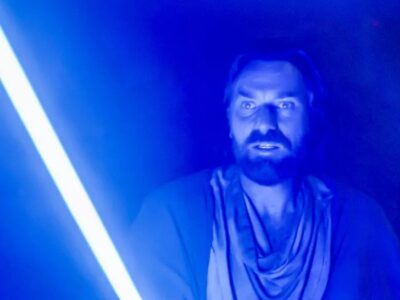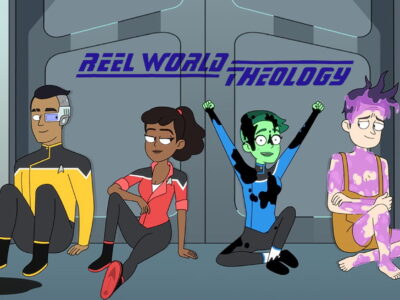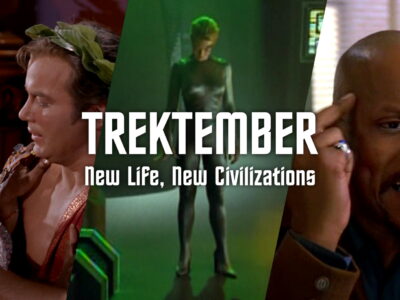Trektember: Lethe | Star Trek: Discovery
As I watched “Lethe,” I couldn’t help but think about how the author of Ephesians (let’s acknowledge scholarly dispute over the epistle’s author, but go with the traditional designation of Paul for convenience) admonishes children to obey their parents.
It’s a straightforward quotation of “the first commandment with a promise” (see Exodus 20:12; Deuteronomy 5:16), but like Paul’s other evocation of that commandment in Colossians 3:20-21, it’s really a sort of “expanded edition” of the original. It connects the statute with a word to wise fathers: “[D]o not provoke your children to anger, but bring them up in the discipline and instruction of the Lord.”
Paul is reminding fathers—and, I think we can fairly extrapolate, mothers, or grandparents, or any adult blessed and burdened with the responsibility of raising children—that honor and respect in the parent-child relationship flows both ways. Not in equal proportions, but in a real way; reflecting the unequal but no less real exchange of love between human beings and our Father in heaven.
Children honor parents with their obedience. Parents honor children by living as the kind of people to whom obedience is freely and gladly given, people who clearly have their children’s best interests at heart.
Michael Burnham and 1 Corinthians 13
Jesus told a story about ideal slaves (there’s a concept that needs unpacking in 21st-century America) who, when praised for their obedience, respond, “We are worthless slaves; we have done only what we ought to have done!” (Luke 17:10). Nevertheless, I think Michael Burnham deserves many thousand quatloos worth of credit for not responding to Sarek in anger at the end of “Lethe.” The revelation she wrung from his mind during the meld she initiated to save his life—that he not only chose his biological son Spock’s chance to join the Vulcan Expeditionary Group over hers, but also covered up his choice with a lie that loaded her with guilt and regret for years—could surely count as a provocation to anger.
But when she could harangue him for his deceit while he lies in Discovery’s sickbay, she instead treats him with love. Not sentimental, sappy love: that fuzzy Hollywood feel-good nonsense that, in some parallel universe, turned “Lethe” into Star Trek: Discovery’s “Very Special Episode.” And not a love that ignores the loving one’s integrity and dignity for the purpose of simply papering things over with the beloved.
Michael’s love doesn’t pretend all is A-OK between Sarek and his foster human daughter; she tells Sarek to his face—as Spock and Sarek could never tell each other throughout the whole of either The Original Series or The Next Generation—that Sarek pushed them “further apart.” And Michael’s love doesn’t deny the hurt and grief that estrangement caused her—something else Spock never did, except in a glancing way when talking with Picard at the end of TNG’s “Unification, Part II.”
But her love is recognizably the kind of love Paul commends in 1 Corinthians 13. “You can do better,” she tells Sarek, showing her commitment to her father’s good, “but I won’t push you.” Michael is patient, not insisting on her own way. “We’ll have this conversation one day,” she says—not this day, when Sarek’s physical health must take precedence over his emotional health.
Despite Sarek’s provocative choice, Michael does not disown him: She insists they remain family, and growing closer is “what families do.” And before she leaves sickbay, she honors him by calling him—still, despite it all—”Father.” Does she say it with an edge of disappointment? Arguably. But she not only says it, she means it. To the best of her ability, she is bearing, believing, enduring, if not all things, at least this one very painful thing. And that’s where a love that endures all things begins.
“I’m Hurt…But There’s Hope”
Michael later tells Ash, “I’m hurt, but there’s hope.” Michael’s love includes hope that she and her father will reconcile.
And who knows? Perhaps they do. After all, if you’re the kind of fan (as I am) who’ll always choose a good in-universe explanation over the mundane production realities of the real world, there must be a reason that Picard, during his prolonged mind-meld with the venerable Vulcan ambassador in TNG’s “Sarek,” doesn’t choke out Michael Burnham’s name with a sob as he does Spock’s, right? And Perrin’s? And Amanda’s? Maybe we will yet see in a Discovery episode to come that Sarek finds some way to tell Michael how much he loves her.
Perhaps, in the moment, it will even seem the logical thing to do.
• • •
Trektember is an annual series about Star Trek; this year, we’re examining the first seasons of Star Trek: Discovery and The Orville. For more information on this series, click here; or, to read every article from the beginning, click here!








Pingback: Trektember: Season 3 Episode List | Reel World Theology